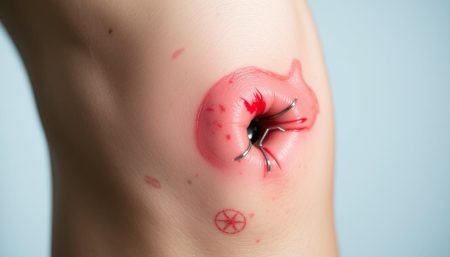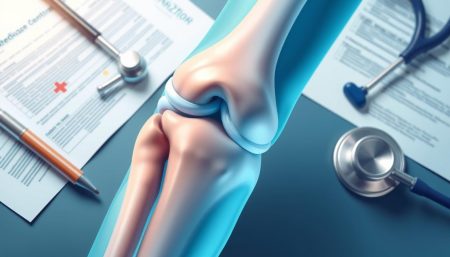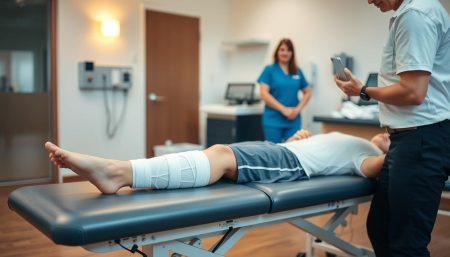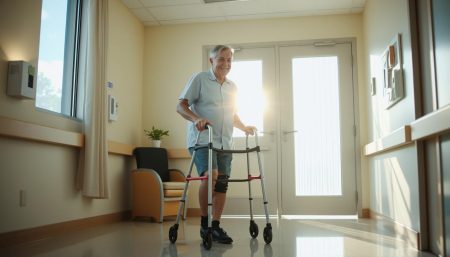Getting a knee replacement can start a new chapter of life, free from chronic pain. But, many patients face some postoperative knee stiffness during their knee replacement recovery timeline. Each person’s recovery is unique, shaped by their own healing journey.
This article aims to be a comforting guide. It combines medical facts with real-life stories to ease worries about knee surgery recovery.
Starting this journey, you might feel anxious and eager to move freely again. Every small step in recovery brings you closer to enjoying life without pain. In the next parts, we’ll offer a detailed guide. It will be filled with expert advice and understanding of the recovery challenges.
Understanding Knee Replacement Surgery and Recovery
Knee replacement surgery is a big medical step to improve mobility and reduce pain. It replaces a damaged knee joint with an artificial one. The journey to recovery and dealing with knee stiffness after knee replacement can be tough. It’s influenced by the knee surgery stiffness duration.
After knee replacement surgery, the body needs time to heal. This healing process can make the knee stiffer at first. It’s important to follow a recovery plan that balances rest and activity. This helps ensure the best results.
To learn more about knee replacement and recovery, Pinnacle Orthopaedics in North Georgia provides detailed advice. They focus on managing knee stiffness after knee replacement.
| Phase | Activity | Goal |
|---|---|---|
| 1-2 Weeks | Gentle walking, use of mobility aids | Reduce stiffness, prevent muscle atrophy |
| 3-6 Weeks | Structured physical therapy | Improve flexibility, increase strength |
| 6 Weeks on | Gradual return to daily activities | Restore normal movement, manage pain |
Following the recommended exercises and keeping a routine is key. It helps reduce knee surgery stiffness duration and speeds up recovery. Each step in the recovery is important. It all adds up to getting the knee back to normal.
The knee joint is complex, making recovery hard. But, with the right medical help and effort in managing knee stiffness after knee replacement, most people can get back to their old life.
Exploring Factors Affecting Knee Stiffness Duration
Knowing about knee replacement stiffness duration is key for those getting knee surgery. Many things affect how long stiffness lasts. Each one plays a part in making a recovery plan for each person.
Being healthy and active before surgery helps a lot. People who are fit tend to get less stiff faster. Those who aren’t as healthy might take longer to recover.
The kind of surgery you have also matters a lot. Big surgeries or ones that mess with the joint more can make recovery longer. This is because the knee gets more hurt.
The prosthesis you get affects stiffness too. Some materials and designs help move better at first. Others might make it harder until they settle in.
How well you follow up with care after surgery is very important. Doing your physical therapy and seeing your doctor helps a lot. It makes moving easier and stiffness less.
| Factor | Impact on Stiffness Duration |
|---|---|
| Pre-surgical Health | Healthier patients tend to recover faster |
| Type of Surgery | More invasive surgery can lead to longer recovery |
| Type of Prosthesis | Material and design can affect initial mobility |
| Postoperative Care | Poor adherence can prolong stiffness |
Understanding these factors helps patients know what to expect. It makes managing knee replacement stiffness duration easier.
How Long Will My Knee Stay Stiff After Knee Replacement
People getting knee replacement surgery often worry about how long their knee will stay stiff. This section talks about the usual recovery times and how to compare them. It helps patients understand their healing journey.
Typical Stiffness Timelines for Post-Surgery Patients
Recovering from knee surgery takes time, with each stage bringing better mobility and less pain. At first, stiffness is common, but it gets better with rehab. Recovery times can vary based on age, health, and how well you follow physical therapy.
Comparing Recovery Rates: What to Expect
Some people see big improvements in stiffness early on, while others face prolonged knee stiffness after knee surgery. This difference comes from the surgery type, physical condition, and care after surgery. Here’s a look at what recovery might be like for you:
| Time Post-Surgery | Average Recovery | Prolonged Stiffness Cases |
|---|---|---|
| 1-3 Weeks | Mild to moderate stiffness; manageable with medication and therapy. | Persistent stiffness, often requiring extended physical therapy. |
| 1-3 Months | Significant improvement in movement; stiffness continues decreasing. | Stiffness may be significant, additional interventions might be necessary. |
| 6 Months | Most patients report minimal stiffness, engaging in normal activities. | Some patients may struggle with stiffness and mobility. |
Knowing these timelines helps set realistic goals and eases worries about recovery. It’s key to talk openly with your healthcare team and stick to your rehab plan to heal well.
Postoperative Knee Stiffness: What’s Normal?
After knee replacement surgery, patients often wonder about their sensations. Managing knee stiffness is key to recovery. It’s normal to feel some stiffness, but knowing what’s normal is important.

In the first few weeks, mild to moderate stiffness is common. This usually gets better with rehabilitation. But, it’s important to watch how long and how bad these feelings are.
| Weeks Post-Surgery | Expected Stiffness | Tips for Management |
|---|---|---|
| 1-2 | Moderate to high | Gentle stretching, medication as prescribed |
| 3-4 | Moderate | Increased physical therapy, hydration |
| 5-6 | Low to moderate | Continued exercises, regular consultant reviews |
| 7+ | Low | Normal activity, observe any changes |
Look out for signs of abnormal stiffness. This could mean an infection or issues with the prosthesis. If you have severe pain, swelling, or redness, see a doctor. Knowing the warning signs and managing stiffness well are important for recovery.
It’s also helpful to hear from others who have had knee replacement. Everyone recovers differently, but hearing their experiences can offer useful tips and support.
Knee Replacement Recovery Timeline: A Step-by-Step Guide
Recovering from knee replacement surgery is key to getting back on your feet. Knowing the recovery timeline helps set realistic goals. It also helps plan for a smoother healing process.
Initial Weeks: The Acute Recovery Phase
The first weeks after surgery are very important. Patients will feel different levels of pain and have limited movement. They need to manage pain, avoid infections, and start with light exercises.
This early stage sets the stage for long-term success. It’s where the groundwork for recovery is laid.
Progressing Through Rehabilitation: Milestones and Goals
As time goes on, the focus turns to more intense rehab. Physical therapy is key to improve movement and strengthen muscles. Walking without help or reaching full knee extension are signs of progress.
Each recovery stage has specific goals. These goals aim to lessen stiffness and boost joint function. Working together with healthcare teams is vital for a faster and better recovery.
Managing Expectations: Knee Surgery Stiffness Duration
When you’re recovering from knee replacement surgery, it’s key to know about knee replacement stiffness duration. Everyone feels different levels of stiffness. It’s important to have realistic goals for your recovery.
The knee replacement stiffness duration depends on many things. This includes your health before surgery, the type of surgery, and how well you follow your doctor’s advice after surgery. Being patient and following a good rehab plan are key to getting better.
Experts say it’s important to be patient and keep going through your recovery. They note that everyone recovers at their own pace.
- Learn about the different recovery phases
- Set goals that are based on what your doctor says
- Stay positive while you’re rehabbing
Also, talking to your healthcare team is vital. They can adjust your treatment if needed. This helps prevent stiffness from lasting too long. Here’s a look at how long stiffness might last in different recovery situations:
| Recovery Type | Expected Stiffness Duration |
|---|---|
| Minimal Rehab | 6-8 weeks |
| Average Rehab | 4-6 weeks |
| Intensive Rehab | 2-4 weeks |
Remember, stiffness can be uncomfortable, but it’s usually temporary. Following a doctor-approved exercise plan can help you get moving again faster.
In summary, understanding knee replacement stiffness duration helps with mental preparation. It also helps plan your recovery with your healthcare team.
Exercises to Alleviate and Manage Knee Stiffness
Managing knee stiffness after knee replacement is key to a good recovery. Adding specific exercises to your daily routine can help. These exercises can reduce stiffness and improve knee mobility.
Stretching and Flexibility Routines
Stretching is essential for knee joint mobility and reducing stiffness. It’s important to do gentle, controlled stretches every day. These stretches target the muscles around the knee, helping with flexibility during recovery.
- Heel and calf stretch
- Quadriceps stretch
- Hamstring stretch
Strengthening Exercises to Support Knee Mobility
Strengthening exercises are needed after knee replacement surgery to prevent stiffness. These exercises build muscle strength around the knee. This supports the joint and improves mobility.
- Lying leg lifts
- Seated leg presses
- Standing knee bends
| Exercise | Frequency | Benefits |
|---|---|---|
| Heel and calf stretch | Daily | Improves lower leg flexibility, essential for walking |
| Quadriceps stretch | 2-3 times a day | Enhances thigh muscle elasticity |
| Hamstring stretch | 1-2 times a day | Reduces tension at the back of the knee |
| Lying leg lifts | Every other day | Strengthens upper thigh and hip flexors |
| Seated leg presses | 3 times a week | Builds strength in quadriceps and hamstrings |
| Standing knee bends | Every other day | Promotes flexibility and strength in the knee joint |
Being consistent with these exercises is very important for managing knee stiffness after knee replacement. Starting exercises early, with a doctor’s guidance, can lead to better mobility in the long run.
Physical Therapy’s Role in Reducing Knee Replacement Stiffness Duration
Physical therapy is key in speeding up recovery after knee replacement surgery. It helps reduce knee replacement recovery time and postoperative knee stiffness. Each patient gets a special physical therapy plan to help them recover faster and better.
Physical therapists create a plan based on how well you move, your muscle strength, and how mobile you are. They focus on what you need most. This way, they can make exercises that improve your flexibility and keep your joints healthy.
- Early mobilization exercises to reduce stiffness and improve circulation.
- Strength training targeting surrounding muscles to support the knee joint.
- Stretching routines aimed at maintaining and increasing range of motion.
They also use advanced treatments like ultrasound, electrical stimulation, and manual therapy. These help manage pain and stiffness after surgery.
Physical therapy does more than just help your body heal. It also boosts your mental health. It gives you confidence to move and do daily tasks after surgery. Regular physical therapy sessions can greatly reduce knee replacement recovery time and postoperative knee stiffness. This improves your life quality after a knee replacement.
Studies show that physical therapy is essential for a good recovery. Everyone recovers at their own pace. But sticking to a physical therapy plan can lead to better results and less stiffness after surgery.
In short, physical therapy is very important in knee rehabilitation after surgery. It not only shortens recovery time but also eases the pain of knee stiffness. This makes getting back to full mobility faster and easier.
Knee Replacement Recovery Time: Personal Stories of Healing
Every person’s recovery from knee replacement surgery is different. It depends on their health, the surgery, and care after it. We share real stories of recovery, showing both common and unique recovery times.
Real-life Recovery Experiences
Many patients have shared their journeys. They talk about the good and the tough parts of recovery. Some feel better fast, while others take longer. Their stories help others know what to expect and offer hope.
Average Versus Atypical Recovery Scenarios
Let’s look at how recovery can vary. Here’s a table comparing typical and unusual recovery paths:
| Time Post-Surgery | Average Recovery Experience | Atypical Recovery Experience |
|---|---|---|
| 6 Weeks | Pain significantly reduced, beginning to walk without assistance | Persistent discomfort, requiring extended use of assistive devices |
| 3 Months | Engaging in low-impact activities, minimal pain | Occasional pain, starting physical therapy |
| 6 Months | Most activities resumed, full range of motion restored | Limited range of motion, additional interventions required |
| 1 Year | Complete recovery, return to pre-surgery lifestyle | Gradual improvements, but not fully recovered |
Recovery times can differ a lot. Knowing this helps set realistic goals and stay patient during recovery.
These stories show how recovery can change a lot. Hearing about others’ struggles and wins can inspire and support you. Understanding the range of recovery experiences helps prepare you for your own journey.
Prolonged Knee Stiffness After Knee Surgery: When to Seek Help
It’s normal to feel some knee stiffness after surgery. But, if it lasts too long, you need to pay attention. Knowing when to see a doctor is key to avoiding long-term problems.
Recognizing the signs early contributes to better management and lessens the likelihood of complications.
Look out for signs like severe pain, swelling, or trouble moving your knee. These can mean you need to see a doctor sooner than later.
| Signs of Concern | Recommendations |
|---|---|
| Continuous swelling | Consult a physiotherapist |
| Pain that worsens | Seek immediate medical advice |
| Limited range of motion | Schedule an evaluation for possible complications |
Stiffness that lasts can mean there’s a problem that needs fixing. Issues like infections or scar tissue can cause this. Getting help early is important to fix these problems.
- Continuous monitoring of symptom progress
- Maintaining proactive communication with healthcare teams
- Adhering strictly to prescribed rehabilitation programs
If knee stiffness is really bothering you, don’t wait to get help. The sooner you get treatment, the better you’ll feel in the long run.
Minimizing Knee Stiffness Through Surgical Techniques
New surgical techniques have been developed to help manage knee stiffness after knee replacement. These methods aim to make recovery faster and reduce discomfort. They promise to make the healing process smoother.
Advancements in Knee Replacement Procedures
New surgical technology has led to less invasive knee replacement techniques. These methods reduce tissue damage during surgery. Precision tools and computer-assisted surgery help surgeons place implants more accurately.
This precision is key in managing knee stiffness after knee replacement. It ensures the joint works naturally after surgery.
Better pain management protocols have also been introduced. These help patients move more in the early stages after surgery. Early movement is essential for reducing knee stiffness and speeding up recovery.
Choosing the Right Surgeon for a Smoother Recovery
Choosing a surgeon with the latest knee replacement technologies is important. Their skill affects both the surgery’s success and the patient’s recovery.
Finding the right surgeon can be challenging. It’s important to gather reliable information. Resources like this detailed article provide valuable insights into knee replacement surgeries and recovery.
When selecting a surgeon, look for those who stay updated with the latest procedures. Success in managing knee stiffness starts with an operation that reduces complications and improves knee mobility.
In conclusion, combining advanced surgical techniques with a skilled surgeon’s expertise is key. This approach provides a solid foundation for managing knee stiffness after knee replacement.
Impact of Lifestyle Choices on Knee Recovery and Stiffness
Knowing how lifestyle choices affect knee surgery stiffness is key for better recovery. After surgery, what you eat, whether you smoke, and how active you are all matter. These factors greatly influence how well you heal.
Good nutrition is essential for quick recovery after knee surgery. Foods high in vitamins, minerals, and antioxidants help fight inflammation. Proteins are vital for fixing and strengthening tissues. Choosing the right foods can make a big difference in how fast you recover and how stiff your knee stays.
Quitting smoking is also very important. Smoking narrows blood vessels and hinders blood flow, which is needed for healing. Stopping smoking can improve blood flow and oxygen to tissues. This is key for faster healing and less knee stiffness.
Doing gentle exercises is also important. These exercises help keep your knee flexible and strong. It’s important to follow a physical therapist’s advice to make sure you’re doing the right exercises for your knee.
- Dietary changes: Eat foods that fight inflammation and make sure you get enough protein.
- Smoking cessation: Get help to stop smoking to improve blood flow and healing.
- Physical activity: Stick to a workout plan made by a physical therapist.
Changing your lifestyle can help reduce knee stiffness and improve your recovery. By making these healthier choices, you can actively help your knee heal after surgery.
Medical Interventions for Persistent Knee Stiffness
For those dealing with long-term knee stiffness after surgery, there are several medical options. These can help ease pain and improve movement. It’s important for patients to understand these choices to find the best fit for their recovery.
Medications and Supplements to Enhance Healing
Less invasive treatments often start with medications. Anti-inflammatory drugs and muscle relaxants can help. They reduce pain and increase movement.
In some cases, doctors might suggest supplements for joint health. Glucosamine and chondroitin are sometimes used for osteoarthritis. But, always talk to your doctor about these to avoid side effects.
Invasive Procedures for Long-term Stiffness
When medications don’t work, more serious steps might be needed. Procedures like manipulation under anesthesia (MUA) can help. It involves moving the knee while the patient is asleep.
But, MUA carries risks. Revision surgery might be needed for mechanical issues or severe stiffness. Each person’s recovery is different, and these decisions are made with their health in mind.
FAQ
Q: How Long Will My Knee Stay Stiff After Knee Replacement?
A: Knee stiffness after surgery usually gets better in a few months. It might take up to a year for some people to fully move their knee again. How long it takes can depend on how well you follow your physical therapy and how your body heals.
Q: What Are the Basics of Knee Replacement Surgery and Recovery?
A: Knee replacement surgery replaces damaged parts of the knee with artificial ones. After surgery, you’ll start to heal and move more. You’ll also do physical therapy to get your knee working again and to stop pain.
Q: What Factors Affect Knee Stiffness Duration?
A: Several things can affect how long knee stiffness lasts. These include your health before surgery, how active you are, the type of surgery, and how well you follow your post-surgery care.
Q: What Are the Typical Stiffness Timelines for Post-Surgery Patients?
A: Most people see their knee stiffness get better over weeks to months. By sticking to your rehabilitation plan, you can see big improvements in your knee’s flexibility and movement in 3 to 6 months.
Q: What Constitutes Normal Postoperative Knee Stiffness?
A: Normal stiffness after surgery includes some trouble bending and straightening your knee, a bit of swelling, and some discomfort. This should get better with regular physical therapy and exercise.
Q: Can You Describe the Knee Replacement Recovery Timeline?
A: The recovery starts with the first few weeks focusing on healing and starting to move a bit. Then, as you get better, you’ll do more exercises to build strength and flexibility.
Q: How Important Is it to Manage Expectations Regarding Knee Surgery Stiffness Duration?
A: It’s very important to manage your expectations after knee surgery. Knowing that stiffness is a normal part of healing helps you set realistic goals and stay positive. This can make your recovery smoother.
Q: What Exercises Can Help Alleviate and Manage Knee Stiffness?
A: Exercises like stretching and strengthening can really help with knee stiffness. Your physical therapist will create a plan that includes exercises like heel slides and knee bends.
Q: How Does Physical Therapy Contribute to Reducing Knee Stiffness Duration?
A: Physical therapy is key in reducing stiffness. It includes exercises tailored to you, manual therapy, and advice on how to stay active. A physical therapist will also check your progress and adjust your treatment as needed.
Q: Can You Share Some Personal Stories of Healing and Recovery?
A: People who’ve had knee replacement surgery often talk about how it improved their mobility and reduced pain. Everyone’s recovery is different, but these stories can be inspiring and helpful.
Q: When Should I Seek Help for Prolonged Knee Stiffness After Surgery?
A: If your knee stiffness lasts longer than expected, gets worse, or is very painful, you should talk to your doctor. These signs could mean there’s a problem that needs medical help.
Q: Do Surgical Techniques Affect Knee Stiffness?
A: Yes, the way surgery is done can affect how stiff your knee is after. Choosing a surgeon who uses the latest techniques can make your recovery easier and faster.
Q: What Lifestyle Changes Can Impact Knee Recovery and Stiffness?
A: After surgery, eating well, quitting smoking, and slowly starting to be more active can help your knee heal faster. Keeping a healthy weight also reduces stress on your joint, helping it recover better.
Q: What Medical Interventions Are Available for Persistent Knee Stiffness?
A: For stiffness that doesn’t go away, there are treatments like anti-inflammatory drugs and supplements. In some cases, you might need more serious treatments like manipulation under anesthesia or even another surgery. Always talk to your doctor about the risks and benefits of these options.


















